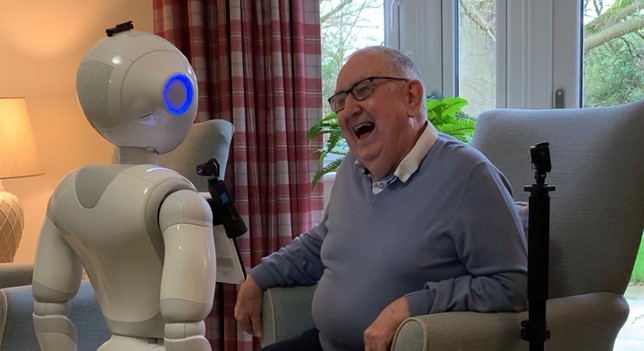The pandemic has left a large majority of the elderly population cut off from the outside world. Therefore, putting them at risk of developing negative effects of loneliness. What if we could use robots to help the elderly feel a little less lonely during the pandemic?
Culturally Competent Robots, The First of its Kind
Using Artificial Intelligence, scientists have developed the first culturally competent robot with the aim to assist older adults living in long-term care homes.
Pepper is part of the CARESSES (Culture-Aware Robots and Environmental Sensor Systems for Elderly Support) project. This is an international project funded by the European Union (EU) and the Japanese government.
Pepper is a fully autonomous robot, in other words, it is not controlled remotely by a person. The human-shaped robot is designed to be socially competent. Therefore, it interacts in a way that is appropriate to the user’s culture, customs, and preferences.
Social Isolation – A Curse or a Cure?
According to World Population Prospects 2019, 1 in 6 people in the world will be over the age of 65 by 2050. As people grow older, they tend to become isolated as a result of retirement from work or the death of family members. Sometimes their only form of social interaction is that with their health care team.
As a way to reduce the risk of infection among the elderly, countries have implemented strict laws. Limited visits with family members are part of the precautionary measures. Additionally, nonessential medical staff in nursing homes have also been put on hold.
However, the measures while beneficial have greatly limited their social interaction, putting them more at risk for loneliness and reduced longevity.
According to research, social isolation can increase the risk of developing dementia by 50%. It can also lead to increased depression, anxiety, and suicidal ideation among older adults.
Socially Competent Robots Cause Significant Improvement in Mental Health
All 45 participants were residents at Advinia Health Care. They were all aged 65 years or older and possessed sufficient cognitive and physical health.
The participants self-identified with either the Indian, Japanese or English culture. They were allocated to an experimental group, control group 1 or, control group 2.
Those in the experimental group received Pepper or a limited version of this software (control group 1) for 18 hours across 2 weeks. However, control group 2 continued to receive care as usual.
The results show that using the CARESSES artificial intelligence in robots such as Pepper has real potential benefit to a world that is witnessing more people living longer with fewer people to look after them.
Dr. Chris Papadopoulos
Participants, who interacted with Pepper, reported a significant improvement in their mental health. Moreover, after 2 weeks of use, there was a small but significant positive effect on the severity of loneliness among the users.
Dr. Chris Papadopoulos, the lead author of the study, believes the robot can be a useful ‘supplementary tool to help stimulate people’s mental health.’
While results demonstrate that our experimental robot was more culturally competent to users, they also reveal that there is room for improvement. Participants were mostly positive but also criticized some of the interactions which are probably due to speech recognition limitations. Further research will build on this pioneering project in the future.
Irena Papadopoulos
Reference:
Papadopoulos C, Hill T, Battistuzzi L, et al. The CARESSES study protocol: testing and evaluating culturally competent socially assistive robots among older adults residing in long term care homes through a controlled experimental trial. Arch Public Health. 2020;78:26. Published 2020 Mar 20. doi:10.1186/s13690-020-00409-y
National Academies of Sciences, Engineering, and Medicine. 2020. Social Isolation and Loneliness in Older Adults: Opportunities for the Health Care System. Washington, DC: The National Academies Press. https://doi.org/10.17226/25663.
Culturally competent robots could improve mental health and loneliness in older people. (n.d.). Retrieved September 13, 2020, from https://www.beds.ac.uk/news/2020-archive/september/culturally-competent-robots-could-improve-mental-health-and-loneliness-in-older-people/




